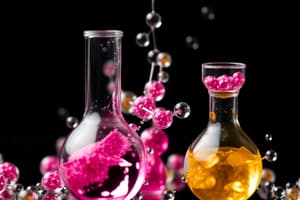Podcast
Questions and Answers
What is the H+ donor in an acid-base reaction?
What is the H+ donor in an acid-base reaction?
- Acid (correct)
- Salt
- Base
- Water
What type of reaction involves the addition of water to a compound?
What type of reaction involves the addition of water to a compound?
- Acid-base reaction
- Metathesis reaction
- Oxidation-reduction reaction
- Hydration reaction (correct)
What is the result of oxidation in an oxidation-reduction reaction?
What is the result of oxidation in an oxidation-reduction reaction?
- No change in electrons
- Loss of electrons (correct)
- Gain of electrons
- Transfer of protons
What type of reaction involves the formation of an insoluble solid?
What type of reaction involves the formation of an insoluble solid?
What is the result of reduction in an oxidation-reduction reaction?
What is the result of reduction in an oxidation-reduction reaction?
What type of reaction involves the formation of a coordination compound?
What type of reaction involves the formation of a coordination compound?
What is the general equation for an acid-base reaction?
What is the general equation for an acid-base reaction?
What is the role of CuSO4 in the reaction Cu + CuSO4 → Cu2+ + Cu?
What is the role of CuSO4 in the reaction Cu + CuSO4 → Cu2+ + Cu?
What type of reaction involves the exchange of partners between two compounds?
What type of reaction involves the exchange of partners between two compounds?
What is the formula for the hydrated compound formed from CuSO4 and water?
What is the formula for the hydrated compound formed from CuSO4 and water?
Flashcards are hidden until you start studying
Study Notes
Reactions in Aqueous Solutions
Acid-Base Reactions
- Involve transfer of H+ ions (protons)
- Acid (H+ donor) + Base (H+ acceptor) → Salt + Water
- Examples:
- HCl (acid) + NaOH (base) → NaCl (salt) + H2O (water)
- CH3COOH (acid) + NaOH (base) → CH3COONa (salt) + H2O (water)
Hydration Reactions
- Involves the addition of water to a compound
- Examples:
- CuSO4 (anhydrous) + 5H2O → CuSO4·5H2O (hydrated)
- CaO (lime) + H2O → Ca(OH)2 (slaked lime)
Oxidation-Reduction (Redox) Reactions
- Involve transfer of electrons
- Oxidation: loss of electrons (increased oxidation state)
- Reduction: gain of electrons (decreased oxidation state)
- Examples:
- Cu (metal) + AgNO3 (oxidizing agent) → Cu2+ (oxidized) + Ag (reduced)
- Zn (metal) + CuSO4 (oxidizing agent) → Zn2+ (oxidized) + Cu (reduced)
Precipitation Reactions
- Involve formation of an insoluble solid (precipitate)
- Examples:
- NaCl (aq) + AgNO3 (aq) → AgCl (precipitate) + NaNO3 (aq)
- BaCl2 (aq) + Na2SO4 (aq) → BaSO4 (precipitate) + NaCl (aq)
Complexation Reactions
- Involve formation of a coordination compound
- Examples:
- Co(H2O)6³⁺ (aq) + 6NH3 (aq) → [Co(NH3)6]³⁺ (complex ion)
- Cu²⁺ (aq) + 4NH3 (aq) → [Cu(NH3)4]²⁺ (complex ion)
Metathesis Reactions
- Involve exchange of partners between two compounds
- Examples:
- NaCl (aq) + AgNO3 (aq) → NaNO3 (aq) + AgCl (precipitate)
- K2CO3 (aq) + Ca(NO3)2 (aq) → CaCO3 (precipitate) + 2KNO3 (aq)
Molecular Equations
- Represent the reactants and products in their molecular forms
- Examples:
- 2H2 (g) + O2 (g) → 2H2O (l)
- CaO (s) + H2O (l) → Ca(OH)2 (s)
Acid-Base Reactions
- Involve transfer of H+ ions (protons) between an acid and a base
- Acid (H+ donor) reacts with a base (H+ acceptor) to form a salt and water
- Examples of acid-base reactions include:
- HCl (acid) + NaOH (base) → NaCl (salt) + H2O (water)
- CH3COOH (acid) + NaOH (base) → CH3COONa (salt) + H2O (water)
Hydration Reactions
- Involve the addition of water to a compound
- Examples of hydration reactions include:
- CuSO4 (anhydrous) + 5H2O → CuSO4·5H2O (hydrated)
- CaO (lime) + H2O → Ca(OH)2 (slaked lime)
Oxidation-Reduction (Redox) Reactions
- Involve transfer of electrons between reactants
- Oxidation: loss of electrons, resulting in an increased oxidation state
- Reduction: gain of electrons, resulting in a decreased oxidation state
- Examples of redox reactions include:
- Cu (metal) + AgNO3 (oxidizing agent) → Cu2+ (oxidized) + Ag (reduced)
- Zn (metal) + CuSO4 (oxidizing agent) → Zn2+ (oxidized) + Cu (reduced)
Precipitation Reactions
- Involve formation of an insoluble solid (precipitate) from reactants
- Examples of precipitation reactions include:
- NaCl (aq) + AgNO3 (aq) → AgCl (precipitate) + NaNO3 (aq)
- BaCl2 (aq) + Na2SO4 (aq) → BaSO4 (precipitate) + NaCl (aq)
Complexation Reactions
- Involve formation of a coordination compound from reactants
- Examples of complexation reactions include:
- Co(H2O)6³⁺ (aq) + 6NH3 (aq) → [Co(NH3)6]³⁺ (complex ion)
- Cu²⁺ (aq) + 4NH3 (aq) → [Cu(NH3)4]²⁺ (complex ion)
Metathesis Reactions
- Involve exchange of partners between two compounds
- Examples of metathesis reactions include:
- NaCl (aq) + AgNO3 (aq) → NaNO3 (aq) + AgCl (precipitate)
- K2CO3 (aq) + Ca(NO3)2 (aq) → CaCO3 (precipitate) + 2KNO3 (aq)
Molecular Equations
- Represent reactants and products in their molecular forms
- Examples of molecular equations include:
- 2H2 (g) + O2 (g) → 2H2O (l)
- CaO (s) + H2O (l) → Ca(OH)2 (s)
Studying That Suits You
Use AI to generate personalized quizzes and flashcards to suit your learning preferences.




